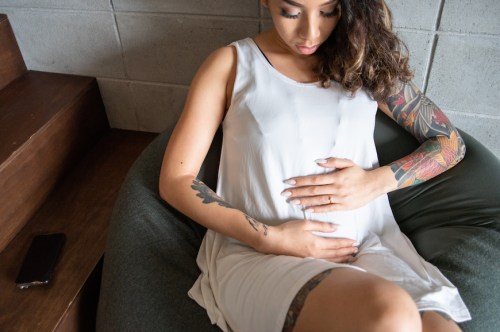OK, TMI: Why Does Pregnancy Make You So Freaking Constipated?
Two OB/GYNs share why constipation in pregnancy is so common and provide easy nutrition and lifestyle tips on how to put an end to it.

There are some pregnancy symptoms everyone talks about, like having to pee way more than you usually do and forgetting what you were talking about mid-sentence. Then there are the things that are truly unpleasant and don’t seem to be talked about as much, like pregnancy constipation.
Experts in This Article
board-certified OB/GYN and founder of the Integrative Medical Group of Irvine
Temeka Zore, MD, is an OB/GYN, reproductive endocrinologist, and an infertility specialist at Spring Fertility.
A new Finnish study is blowing the lid off this secret struggle. Forty percent of the study’s participants reported experiencing regular constipation during pregnancy—higher than the control group. While the problem improved for most of the participants after giving birth, that’s a long time to wait for relief.
What causes pregnancy constipation?
According to Temeka Zore, MD, OB/GYN, reproductive endocrinologist, and infertility specialist at Spring Fertility, there are a few reasons why many pregnant people deal with constipation. Unsurprisingly, hormones are partly to blame. “Pregnancy is a high hormonal state dominated by elevated estrogen and progesterone levels,” Dr. Zore says. “Progesterone in pregnancy causes muscle relaxation, and your bowels are composed of smooth muscle. So the high progesterone leads to relaxation of the smooth muscle in the colon and to reduced activity, thus increasing the likelihood of constipation.”
Besides that, integrative OB/GYN Felice Gersh, MD, says increased iron intake (whether through a prenatal supplement or food) can also contribute to pregnancy constipation. While it’s important to up iron consumption during pregnancy to make blood for your baby, Dr. Gersh says iron can be constipating.
“Another reason could be being less active during pregnancy, which can also lead to constipation,” Dr. Gersh says. Plus, she says many pregnant people often don’t drink enough water. “They may be drinking less because they don’t want to have to pee so often, but not drinking enough water can slow down the digestive process,” she says, which can make constipation worse.
How to relieve pregnancy constipation
Fortunately, both MDs say there are some easy nutritional and lifestyle tweaks that can help ease this very common pregnancy symptom. Based on what causes pregnancy constipation, you can probably guess the first tip: Drink more water. You may have to pee more, but being dehydrated will lead to other symptoms besides feeling constipated, including feeling mentally sluggish. “Pregnant women are encouraged to drink a lot of water, approximately 10 cups a day, which can aid in softening the stool to make it easier to pass,” Dr. Zore says.
Both doctors also recommend eating more fiber. “This can draw water into the bowels and help add bulk to the stool, also making it easier to pass,” Dr. Zore says. Some fiber sources both doctors say to prioritize include whole grains, legumes, berries, broccoli, and dark, leafy greens. Dr. Gersh says it’s also important to make sure you’re getting enough magnesium, which she says is a common nutrient deficiency in pregnant people. (You want to aim to get 350-360 milligrams a day.) “Not getting enough magnesium can lead to feeling constipated, so eating foods like walnuts, pumpkin seeds, and spinach—which are all high in the nutrient—can help,” she says.
Since inactivity can also lead to constipation, Dr. Gersh also recommends walks, or even just elevating your feet if walking is too much effort. “Elevating your feet for an hour in the afternoon can help reduce ankle swelling too,” she adds.
If you try all of these solutions and it still doesn’t seem to help, Dr. Zore recommends talking to your OB/GYN, and doing so before taking any medications for constipation (including any teas specifically marketing relief), because those might not be safe for pregnant people.
So yes, pregnancy constipation is yet another fun experience that only enhances the hormonal mood swings and swollen feet, but thankfully there are solutions. Don’t be afraid to talk to your doctor about how you’re feeling. They’ve truly heard it all, so don’t be shy. It’s definitely better than suffering in silence!
Speaking of pregnancy, here’s your guide to eating for you and your baby in every trimester:
Oh hi! You look like someone who loves free workouts, discounts for cult-fave wellness brands, and exclusive Well+Good content. Sign up for Well+, our online community of wellness insiders, and unlock your rewards instantly.
Sign Up for Our Daily Newsletter
Get all the latest in wellness, trends, food, fitness, beauty, and more delivered right to your inbox.
Got it, you've been added to our email list.










